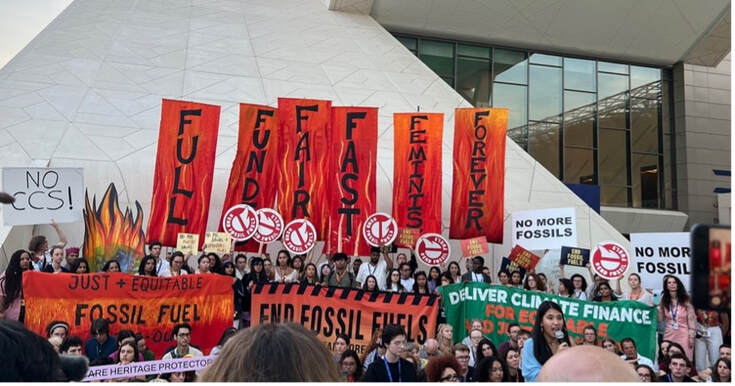|
By: Cailey Carpenter For two weeks in Dubai, there was a fiery energy that emanated from every square inch of the Convention Center. With each passing day, I could feel the pressure mounting on decision makers at COP28. But this sense of urgency wasn’t just contained to the decision makers. Tired of standing on the sidelines of countries’ frustrating acts of self-interest, youth and interest groups made their presence known at COP28. These activists didn’t shy away from protests despite the ‘shocking level of censorship’ of the UAE presidency. One protest in particular caught my eye: Not only did I find this activism a bold move in a country that produces 3.2 million barrels of petroleum products per day, I was taken by surprise when reading the sign entitled “NO CCS!”, CCS being shorthand for Carbon Capture and Storage. This was not an isolated event – messages against CCS ran rampant throughout COP28. Why would we oppose the our most promising method to remove carbon from our atmosphere? This is our hope at a net-negative carbon economy, and arguably, a key component of reaching net-zero carbon emissions in a reasonable time frame to combat the major effects of climate change. I understand the sentiment that CCS is a way by which big oil producers can avoid accountability for their actions by pushing the responsibility of emissions to CCS technologies/companies. It is true that avoiding a phase out of fossil fuels expecting a scale-up of CCS is an irresponsible and unsustainable solution. However, I don’t think this is a reason to completely discount CCS as a viable climate solution. CCS is often a controversial topic because many don’t understand the relative weight of the risks and benefits, so I found the blind rejection of CCS at COP28 troubling. This post aims to clarify the prospects of carbon capture and storage (CCS) for mitigating climate change.
The truth is: CCS technology is not as robust as we’d like it to be as a large-scale decarbonization solution. There are still major issues we need to deal with before implementing CCS worldwide – challenges that are scientific, engineering, and political in nature. In 2023, the IPCC estimated that even if CCS is deployed at current full capacity, it will only make up 2.4% of global climate mitigation strategy. Many of the promising CCS projects have either stalled or shut down. Selecting a location with the correct geochemical makeup for long-term storage is difficult. Monitoring CO2 capture and storage has its challenges because we can’t directly see a mile below ground where these plants often operate. But most of all, CCS is expensive with few direct benefits to the operator. CCS operations are estimated to cost $20-110 per metric ton of CO2 stored. The use of fossil fuels leads to emissions of 34 billion metric tons per year, so this adds up quickly. On top of this, what’s to gain from CCS beyond the common good? There is no financial incentive to set up and maintain a CCS project, and CCS comes with liabilities. Monitoring of CO2 remains a challenge, making leaks difficult to detect. If CO2 does leak out, the blame and disdain is directed towards the owners. Furthermore, there is ongoing debate among scientists as to whether pumping CO2 underground can increase seismic activity and trigger earthquakes, something world leaders aren’t willing to risk on behalf of disapproving populations. CCS cannot succeed without further innovation, and most importantly, regulation. Regulation on a global scale is a difficult endeavor, which is why COP is critical for achieving our climate targets. In my eyes, COP is a place where no climate solutions should be off-limits. COP shouldn’t end in empty promises; leaders must negotiate towards a plan of action that is feasible for all parties, even if this includes unconventional methods. Science and engineering innovation work quicker than negotiating policies, so the technical challenges should not be the limiting factor. We need to accelerate climate change mitigation more than ever, and CCS may play a key part in this. This leads us back to the statement that started this all: “NO CCS!”. While I agree with the message that CCS is not a means for fossil fuel producers to evade responsibilities for their significant contributions to the climate crisis, I believe this language can easily be interpreted in a way that perpetuates misinformation. The public can be easily influenced, so it is of vital importance for scientists and climate activists to be cognizant of the way they portray their arguments in order to avoid unintended (and possibly dangerous) side products of their good intentions.
0 Comments
|
Categories
All
Archives
March 2024
|

 RSS Feed
RSS Feed
